MARTIN GECK is professor of musicology at the Technical University of Dortmund. He is the author of more than two dozen books, including Johann Sebastian Bach: Life and Work.
STEWART SPENCER is an independent scholar and the translator of more than three dozen books.
The University of Chicago Press, Chicago 60637
The University of Chicago Press, Ltd., London
2013 by The University of Chicago
All rights reserved. Published 2013.
Printed in the United States of America
22 21 20 19 18 17 16 15 14 13 1 2 3 4 5
ISBN-13: 978-0-226-28469-9 (cloth)
ISBN-13: 978-0-226-28471-2 (e-book)
ISBN-10: 0-226-28469-7 (cloth)
ISBN-10: 0-226-28471-9 (e-book)
Originally published as Robert Schumann. Mensch und Musiker der Romantik. 2010 by Siedler Verlag, a division of Verlagsgruppe Random House GmbH, Munich, Germany.
Geisteswissenschaften International Translation Funding for Humanities and Social Sciences from Germany. A joint initiative of the Fritz Thyssen Foundation, the German Federal Foreign Office, the collecting society VG WORT, and the German Publishers and Booksellers Association.
(182099) after a painting by Adolf von Menzel (18151905). Menzel worked not from life but from one of the daguerreotypes taken in Hamburg in March 1850 by Johann Anton Vllner. (Photograph courtesy of the Heinrich Heine Institute of the Regional Capital of Dsseldorf.)
Library of Congress Cataloging-in-Publication Data
Geck, Martin.
[Robert Schumann. English]
Robert Schumann: the life and work of a romantic composer / Martin Geck; translated by Stewart Spencer.
pages cm
Originally published as Robert Schumann: Mensch und Musiker der Romantik, 2010 by Siedler Verlag. Includes bibliographical references and index.
ISBN-13: 978-0-226-28469-9 (cloth: alkaline paper)
ISBN-10: 0-226-28469-7 (cloth: alkaline paper)
ISBN-13: 978-0-226-28471-2 (e-book)
ISBN-10: 0-226-28471-9 (e-book)
1. Schumann, Robert, 18101856. 2. ComposersGermanyBiography. I. Title.
ML410.S4G29613 2012
780.92dc23
 This paper meets the requirements of ANSI/NISO Z39.481992 (Permanence of Paper).
This paper meets the requirements of ANSI/NISO Z39.481992 (Permanence of Paper).
ROBERT SCHUMANN
The Life and Work of a Romantic Composer
MARTIN GECK
Translated by Stewart Spencer
The University of Chicago Press
Chicago and London

Contents
Prologue
The organs associated with precaution are admirably well developed,anxiety that is even said to stand in the way of my happiness,music,the power of poetrynoble strivinggreat artistic but noble ambitiongreat love of the truthgreat honestygreat benevolenceemotional through and throughsense of formmodestystrength of purpose(Nols phrenological studies on my headMaxen, June 1)
These lines are taken from Schumanns diary entry of June 1, 1846, when the composer and his wife were visiting Maxen Castle near Dresden. The castle and its estate were owned by a retired army major, Friedrich Serre, whose love of art was matched only by his wealth. The Schumanns had been invited to lunch, after which Schumann played whist and was introduced to a Captain Nol, who that same evening undertook a remarkable phrenological examination of him, an examination also recorded in an entry of the same date in Schumanns housekeeping book.
The captain in question was the English phrenologist Robert R. Noel, who was visiting Dresden to discuss his ideas with the local physician, painter, and natural scientist Carl Gustav Carus and to prepare the second edition of his Phrenology, or A Guide to the Study of This Science, with Reference to More Recent Research in the Field of Physiology and Psychology, which was to be published soon afterward by Christoph Arnold in Dresden and Leipzig.
Phrenologythe attempt to deduce a persons characteristics from the shape of his or her skullwas currently enjoying a boom. And to the extent that the measurements that were taken on these occasions were of particular interest to criminologists, Schumann no doubt would have felt a certain squeamishness on presenting his head for the well-known phrenologists inspection, a squeamishness inevitably mixed with the strange and yet by no means unusual desire to learn something new from a third party. And he was rewarded for his pains: the anxiety that had caused him so many problems in his daily life could now be put down to a fateful predisposition, whereas all the other tendencies noted by Noel were admirable in their different ways: noble aspirations, noble artistic ambition, a love of the truth, a sense of form, and strength of purpose.
Of course, the phrenologist knew who he was dealing with that evening in June 1846, and there is no doubt that he was sufficiently familiar with the ways of the world and the mores of his profession not only to inspect Schumanns skull but also to draw on other evidence to ensure that his prominent client, if a little agitated, was able to return to his fellow guests with his head held high. A century and a half later, the present author is moved by Noels portrait of Schumann, for, however vague it may be, there is no doubt that if his description were used in a quiz, anyone tolerably familiar with the history of music would guess that the subject of the inquiry was Schumann rather than Beethoven, Wagner, or Meyerbeer, for we are dealing here with an ambivalence entirely characteristic of the composer. On the one hand, we have the diagnosis of cautionary foresight and anxiety, feelings that tormented Schumann and repeatedly made him seem to suffer from weak nerves and at times to become misanthropic. These are characteristics that, creatively speaking, encouraged him to work on his own personality rather than confront others with his envy, criticism, or condescension. Rarely in his Neue Zeitschrift fr Musik did Schumann rake any of his colleagues over the coals. Nor did he insult his contemporaries in private conversation. The fact of the matter is that he did not like arguments or sneering criticism but had the greatness to hail the young Johannes Brahms as his successor and to acclaim Berlioz as a genius of French romantic realism even though he could not in fact abide the Symphonie Fantastique.
On the other hand, Schumann evinced an admirable courage in repeatedly facing up to the world and fighting for what he believed in, beginning with his protracted struggle to win the hand of Clara Wieck. It was a struggle that ended only when the courts decided in the lovers favor. Then there was Schumanns concern for the welfare of his increasingly large family, which was held together for the most part by Clara, though Schumann too was responsible in no small way for helping to maintain it. More than anything, his anxieties did not prevent him from accompanying Clara on her concert tours or from attending parties and conducting choirs and orchestras. The fact that at the outward high point of his career he assumed the duties associated with the post of director of music in Dsseldorf and that this may have exceeded his powers and ultimately led to his final breakdown was perhaps only to have been expected.
Prior to his collapse, however, Schumann was not lacking in professional , his feat in setting up the Neue Zeitschrift fr Musik without any outside help amounted to a stroke of genius both as a business enterprise and in terms of the cultural politics involved. Nor can we forget his courage in artistic matters. Largely self-taught as a composer, the young Schumann was sufficiently astute to stick in the first instance to piano music, initially regarding composing at the piano as his essential mtier, quite apart from the fact that piano music was easy to publish. From the age of thirty, however, he sought to advance ever further into the field of music First, it was whole sets of songs for voice and piano that reflected his growing self-confidence, before these in turn gave way to instrumental works for more elaborate resources, chamber music, and finally, oratorios and an opera. Toward the end of his career, he managed with his
Next page
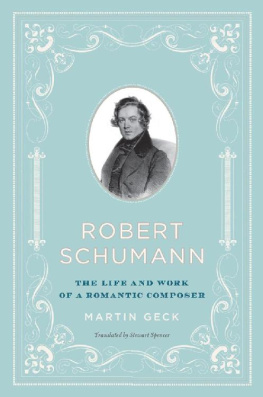




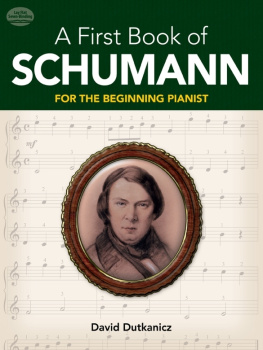

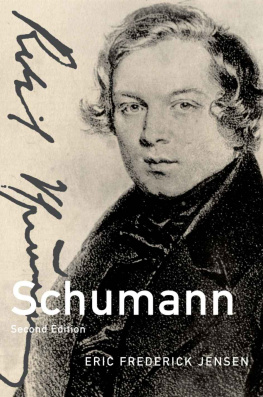
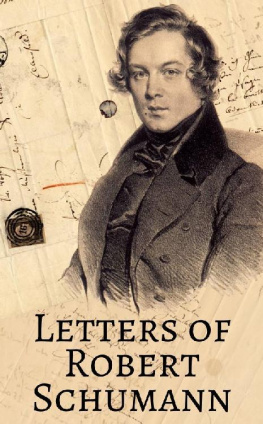
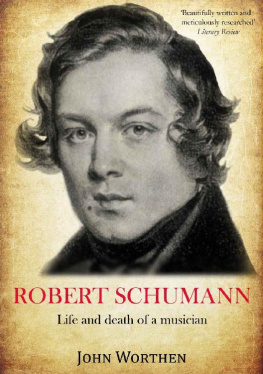

 This paper meets the requirements of ANSI/NISO Z39.481992 (Permanence of Paper).
This paper meets the requirements of ANSI/NISO Z39.481992 (Permanence of Paper).